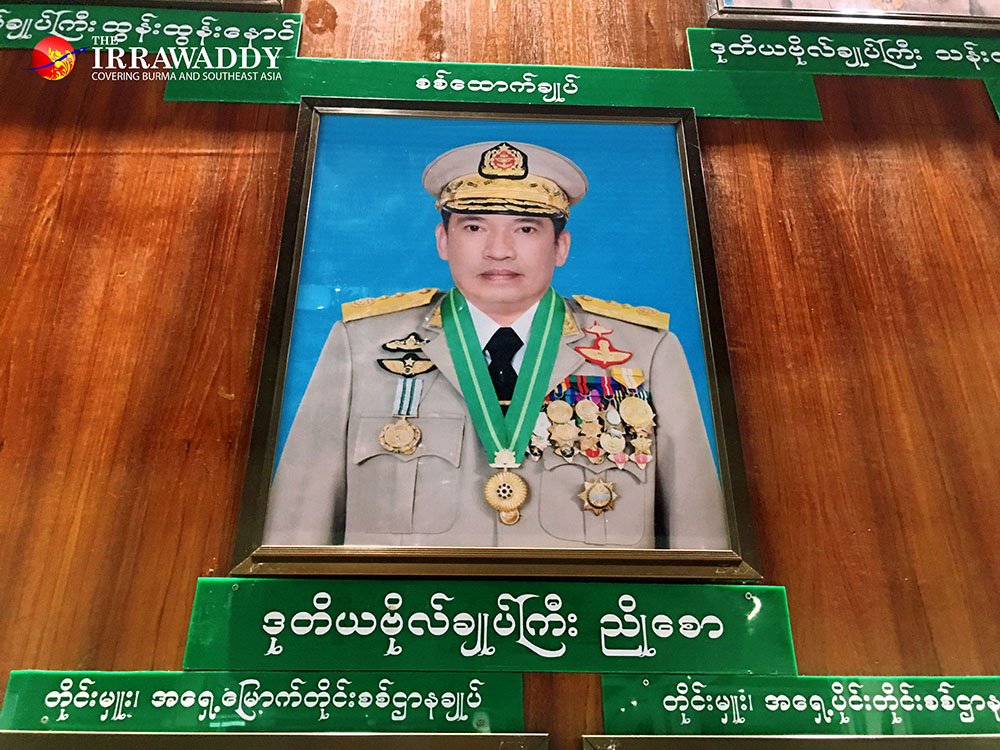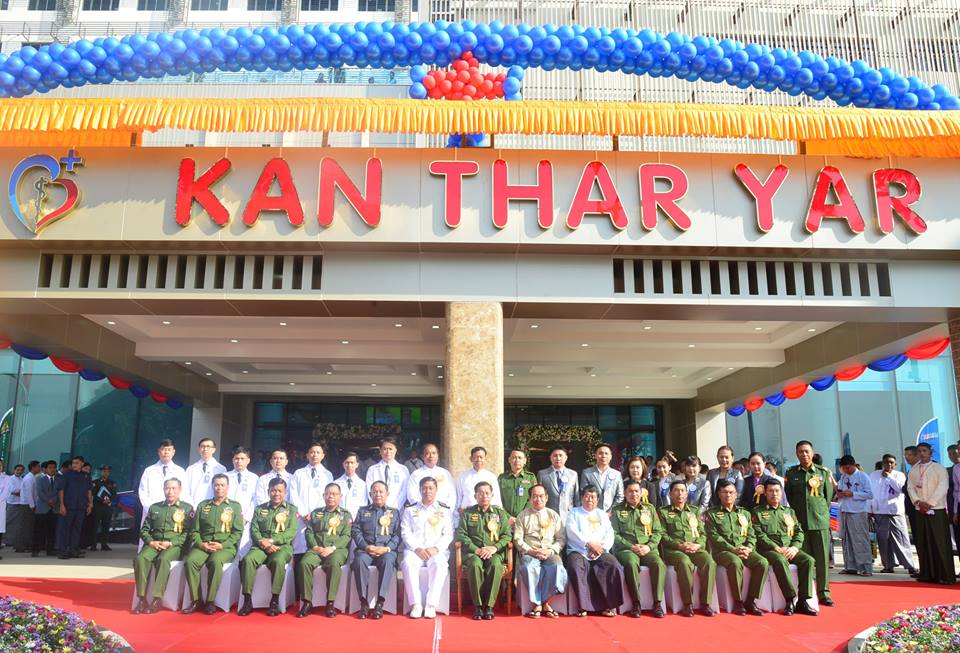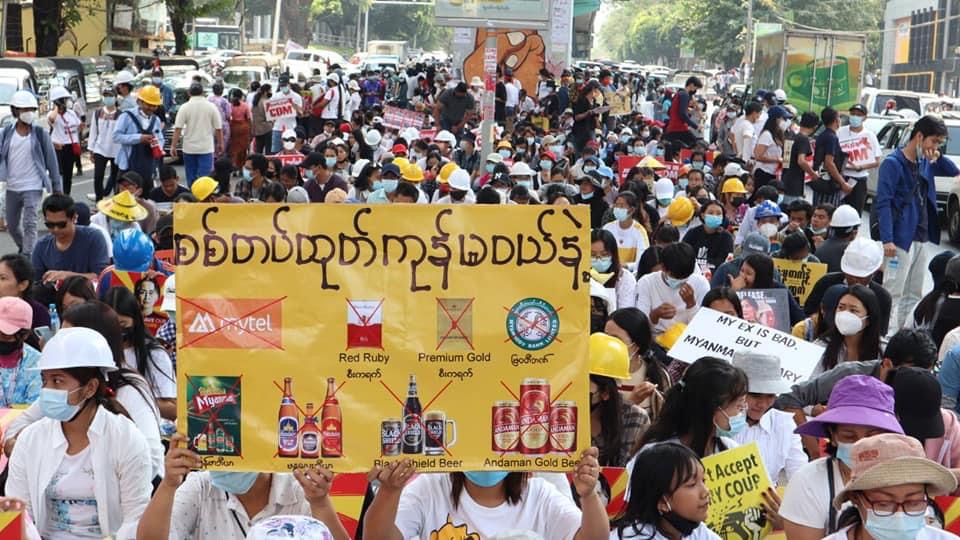For the brutal Myanmar junta that seized power in a coup last year, a retired lieutenant-general is proving to be as important as the soldiers who heartlessly gun down civilians.
Lieutenant General Nyo Saw is a long-time trusted aide of junta leader Senior General Min Aung Hlaing. As the man who manages the Myanmar military’s businesses, he plays a key role in financing the military regime.
Nyo Saw retired from the army in 2020 as quartermaster general. Currently, he serves as the chairman of the military-owned conglomerate Myanmar Economic Corporation (MEC) and holds senior positions in Inwa Bank and the Union of Myanmar Economic Holdings Ltd (UMEHL), both of which are also military-owned.
MEC has over 19 subsidiaries engaged in banking, mining, construction, transportation, communications and food production.

Now that Myanmar’s reserves of foreign currency are dwindling, Nyo Saw has recently been appointed head of a committee to import fuel from Russia, the regime’s major arms supplier. The committee also includes junta-linked cronies.
Former quartermaster general
Nyo Saw graduated from the 23rd intake of the Defense Services Academy, and later served as the commandant of both the Defense Services Technological Academy and the Defense Services Academy, as well as the head of the central and southern commands before he retired as quartermaster general.
“When he served as quartermaster general, he was good-humored and made sure everyone was satisfied. He gets on well with business owners and generals,” a Yangon-based businessman told The Irrawaddy.
The quartermaster general is the officer in charge of arming, supplying and feeding the military. It is the quartermaster general who makes the final decision about the procurement of weapons, as well as foodstuffs and building materials such as cement and iron.
Nyo Saw was quartermaster general from 2014 to April 2020. Before him, General Thiha Thura Tin Aung Myint Oo, who was notorious for corruption, and Major-General Wai Lwin served as quartermaster general.
Tin Aung Myint Oo and Wai Lwin held senior positions in the previous military regime led by former dictator Senior General Than Shwe, and also respectively served as vice-president and defense minister in U Thein Sein’s quasi-civilian government.
During the transition from military rule to civilian rule between 2009 and 2012, the two generals played a key role in transferring state assets, including state-owned land and numerous businesses, to UMEHL under the guise of privatization.
Some of the projects initiated by Nyo Saw and his predecessors were the Bo Aung Kyaw Port in downtown Yangon, for which U Johnathan Kyaw Thaung’s KT Group was awarded the contract, and the Polo Club Hotel and luxury residence, built on the site of the former national library in Yangon’s Tamwe Township, for which the HSL Group, a joint venture of Myanmar companies, won the tender. China’s state-owned China State Construction and Engineering Corporation was the developer of the project.

“Nyo Saw was the quartermaster general during the transfer of power [to a civilian government] in 2015. Numerous projects were put out to tender at the time for the generals to line their own pockets. Nyo Saw managed to handle them successfully, thereby winning the trust [of Min Aung Hlaing],” said a business owner who knows Nyo Saw and has won tenders from the defense ministry’s Directorate of Procurement.
Nyo Saw amassed wealth after his appointment as quartermaster general, but has kept a low-profile, added the business owner.
As to the tenders invited by Directorate of Procurement, which is lower in importance than the Office of the Quartermaster General, business owners had to agree to the prices quoted by the directorate instead of making bids, said the business owner.
“The directorate would say if you don’t want to do it at our prices, there are others who will. So those who could buy the officer in charge would win the tender. It is similar but worse at the Office of the Quartermaster General,” he said.
In the 2019-2020 fiscal year, the Myanmar military asked for a budget of 3385.82 billion kyats plus an extra payment of around 200 billion kyats. The military rejected parliament’s attempt to audit its expenditures, citing the sensitive nature of military spending.
The junta leader’s protector
Alongside his official roles in military-owned businesses, Nyo Saw also plays a role in protecting the interests of Min Aung Hlaing’s family.
Nyo Saw was kept on as the head of MEC after his retirement because Min Aung Hlaing, who has not spared even military-owned land to expand his treasury, needs him to protect his interests, a retired military officer told The Irrawaddy.
Min Aung Hlaing has a substantial interest in Kan Thar Yar Hospital, which opened in December 2017, although it is officially registered as a business of the MEC. Nyo Saw oversaw the construction of the private hospital by Inya Lake in Yangon’s most affluent neighborhood. The hospital is within walking distance of one of the mansions Min Aung Hlaing owns in the area.
He was also involved with another private hospital, Moe Kaung Treasure Maternal and Child Hospital, which opened in early May 2021, a few months after the putsch.
Nyo Saw’s wife Daw San San is close to Min Aung Hlaing’s wife Daw Kyu Kyu Hla. She accompanied Daw Kyu Kyu Hla to Russia, along with other wives of generals, when Min Aung Hlaing made a personal visit there in July.
Min Aung Hlaing has accommodated Nyo Saw at his residence on Myat Khin Yeik Tha Lane, said a Yangon businessman. The Irrawaddy could not independently verify his claim.
Nyo Saw salvages military-owned businesses
The coup was followed by a mass boycott of military-linked products and services. Foreign companies partnering with the regime also stopped paying dividends and dissolved their partnerships with the military.

Myanmar Beer and the Mytel telecommunications company were two of the military-owned businesses got hardest by the boycott campaign.
Japanese drinks giant Kirin ended its partnership with the military-owned Myanmar Brewery, whose flagship beverage is Myanmar Beer.
Myanmar Brewery’s revenues plummeted by more than 40 per cent or US$86.4 million, during the third quarter of this financial year compared to the same period last year. Normalized operating profits, meanwhile, fell by just under 50 per cent, according to a report by Kirin.
Kirin sold its 51 per cent stake to Myanmar Brewery for US$164 million, and business owners with links to the junta leader were reportedly involved in the deal. The Irrawaddy could not independently verify those reports.
Telecom provider Mytel lost nearly US$25m in profits and two million customers after the coup, according to a report by rights group Justice for Myanmar late last year.
With junta-linked businesses seeing their profits slashed by the mass boycott of military-owned businesses. MEC and the UMEHL have turned to the mining industry, just like previous military regimes, a mining industry insider told The Irrawaddy.
“The Heinda tin mine in Dawei in Tanintharyi Region and the Moehti Moemi gold mine in Mandalay’s Yamethin Township are now under the control of MEC and UMEHL,” he said.
Myanmar Pongpipat, a Thai-owned mining company, formerly operated the Heinda Mine. The company’s license was not renewed after it expired in June 2019.
Operations at the Moehti Moemi gold mine were suspended in 2018 following disputes between the National Prosperity gold mining company and No. 2 Mining Enterprise of the Ministry of Natural Resources and Environmental Conservation.
Officials of the now junta-controlled ministry told The Irrawaddy that the mine’s operations were still suspended, and told The Irrawaddy to ask the junta’s information team for details.
“The generals say only stupid things in public. But they are not slow in seizing businesses. They are all cunning,” said the mining industry insider.

















